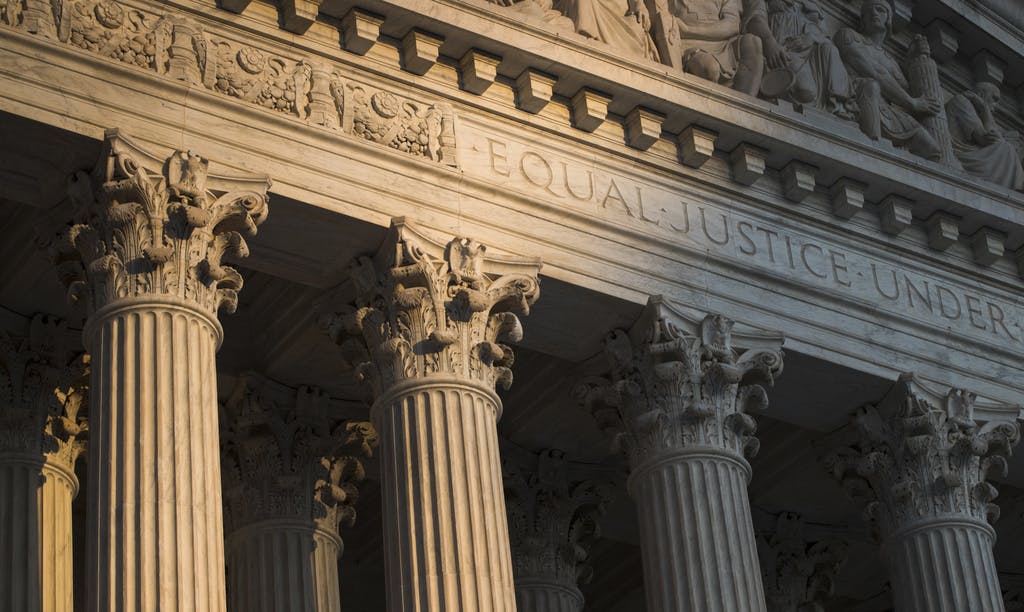Supreme Court To Weigh In on Biden’s ‘Ministry of Truth,’ as White House Comes Under Fire for Colluding With Tech Giants To Suppress Free Speech
The suppressed content covers issues such as Covid lockdowns and Hunter Biden’s laptop, which were posted by public officials, influential private figures, and everyday citizens.

“Insidious” government censorship of social media platforms could soon be unraveled by the Supreme Court as it prepares to weigh in on a showdown between the Biden administration and First Amendment advocates later this term.
A slew of cases are working their way up the high court that seek to shut down President Biden’s so-called Ministry of Truth. That’s how a district judge, Terry Doughty, described the alleged activities by federal officials to suppress online speech they find problematic, the central claim of Missouri v. Biden. The Nine will hear the case next month and could, with a conservative supermajority, deliver a victory for the free-speech rights of digital platforms and their users.
What’s “insidious” and “devious” about the censorship under scrutiny in Missouri is that “it’s not even true regulation. It’s not like they passed a law through the legislature to do this,” a senior scholar at the International Center for Law & Economics, Ben Sperry, tells the Sun. “They were simply doing backroom things to get a result that they could have never done constitutionally.”
Pressure is mounting to end state-sponsored digital censorship. Mr. Sperry’s ICLE joins a host of law centers that have filed amicus briefs in Missouri through the Fifth Circuit Court of Appeals and the Supreme Court after it agreed to hear the case. Later this month, the court will hear arguments in a pair of cases challenging Texas and Florida laws that restrict social media companies from moderating their content.
Adjudication is pending on another two cases argued before the high court in October — Lindke v. Freed and O’Connor-Ratcliff v. Garnier — on the question of whether public officials engage in state action by blocking individuals from their personal social media accounts.
Social media companies have been accused for years of becoming too big and therefore functioning as state actors. These cases could prove the latter part of that allegation true — that government officials have been behind moderation decisions on leading social platforms.
The Biden administration and congressional leaders threatened to reduce Section 230 immunity and bolster regulation of social media companies if they didn’t do their bidding, according to the private meetings and communications uncovered during the initial discovery in Missouri. Targets include Twitter, Facebook, and Amazon, which was allegedly instructed to stop selling certain books that promoted so-called misinformation.
The suppressed content covers issues such as Covid lockdowns and Hunter Biden’s laptop — content that was posted by public officials, influential private figures, and everyday citizens. Vast evidence of censorship was thrown under the spotlight after Elon Musk took over X, formerly Twitter, and made public the platform’s history of temporarily suspending accounts and deleting thousands of posts. Early discovery in Missouri also helped convince the courts of the need to examine the evidence.
The FBI’s role in coordinating with social media executives to suppress free speech has come under increasing scrutiny after Republicans took control of the House of Representatives in 2022. The House Judiciary Committee last week sued an FBI agent, Elvis Chan, accused of colluding, in quarterly phone calls, with then the head of Twitter’s “Trust and Safety Council,” Yoel Roth, to censor protected speech. Mr. Roth has since been fired by Mr. Musk and fled with his family into hiding after receiving death threats.
Social media companies are private actors that are free to exercise editorial discretion, ICLE argues — as long as it’s free from government meddling. “Social media companies have a right to editorial discretion,” Mr. Sperry says, “because their users don’t want to see certain speech, even if it’s lawful. As a private entity, they have a right to balance those speech interests to maximize user engagement.”
When the government intervenes, it disrupts the marketplace of ideas and undercuts consumer engagement, Mr. Sperry argues. Speaking on behalf of ICLE, he says, “we believe markets are better at serving consumers than governments. They have more information, so to speak, as entrepreneurs acting in the marketplace, than government officials and regulators do.”
The government could defend itself by arguing that it coordinates with social media companies to take down content deemed harmful in the interest of national security. “But there’s a big difference,” Mr. Sperry says, “between persuading through the bully pulpit and coercing.” It will likely be difficult for the conservative supermajority in the Supreme Court to dismiss the evidence as a sort of tinfoil hat conspiracy against the government.
Rather, the court could look to legal precedent suggesting that the executive branch lacks the authority to determine what constitutes “misinformation” and to prohibit such content from circulating.
“The remedy for speech that is false is speech that is true,” Justice Anthony Kennedy said in a landmark 2012 case, United States v. Alvarez, which determined that a federal law that criminalized false statements about having a military medal was unconstitutional. “This is the ordinary course in a free society. The response to the unreasoned is the rational; to the uninformed, the enlightened; to the straight-out lie, the simple truth.”

